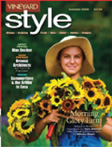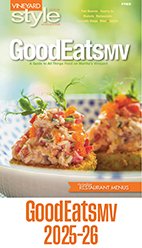ON ISLAND

Slough Farm Cultivates a Vision
The Island's Nonprofit Educational Farm and Gathering Place
By Amelia Smith
Slough Farm sits near Edgartown Great Pond, a cluster of buildings and a garden alongside Katama pastureland. “We start our day pretty much at eight, feeding, watering, and moving animals,” says executive director Julie Scott. “Garden folks are opening up vents in the greenhouse and watering seedlings. At the same time we’re getting the lay of the land, seeing what’s changed overnight, and what needs attention.” Julie has been working at Slough Farm since it got started in 2015, when none of the current buildings existed. Now, there are barns, the farmhouse, a yoga studio, and housing, but it’s been a farm for much longer – the vegetable garden was established in 2000 by the Farm Institute when it was on this site.
After the animals and gardens have begun their day, people arrive for events, to make art, or to learn. The main building includes a spacious common room with a large kitchen that’s available for other Island nonprofits to use. The Yard, Hospice, Martha’s Vineyard Community Services, Island Grown Initiative, and the MV Nonprofit Collaborative are among those who have used the space for board meetings, strategic planning sessions, and more. On Fridays, a group of students from the Martha’s Vineyard Public Charter School arrives for a morning of farming, pottery, or cooking. On weekends, there might be a workshop for adults in ceramics or fiber arts. “We’re making quality food and art programming accessible to the entire community,” says program director Emily Becker.
The sheep barn is part of the main building complex, which forms a 3-sided courtyard. Their wool ties into the arts, and connects the farm to fiber enthusiasts on the island. Each year, sheep are shorn in February at a community spectacle called the “shearing shindig” where Islanders and visitors can see the process first hand, introducing people to the farming part of fiber arts. Slough Farm is also a place for artists to work. Musicians, dancers (in collaboration with The Yard), and visual artists have come to Slough Farm for artist’s residencies lasting a week or two at a time. Artists come here from all over the world, and are supported by food from the farm, a stipend, and travel assistance. One visiting artist created a landscape portrait of the farm in felt that will hang in the classroom in the horse barn.
Slough Farm helps connect people to where food comes from, too, whether that’s garden vegetables or the beef from the cattle grazing nearby. “Bringing people together was really important to our founders. Even if we’re doing something outside, bringing people together around the table is one of the most important things that happens in a day,” Emily says. On weekends, when there is all-day programming, participants congregate around lunch. Some of them might be gardening while others are working in ceramics, and over the meal they share experiences, ideas, and inspiration.
Through partnerships with other organizations like schools, the MV Boys & Girls Club, and the Food Pantry, Slough Farm also works towards food equity. Financial support from Slough Farm helps Island Grown Initiative prepare 40-60,000 frozen meals a year, incorporating local seasonal produce from the farm. “We don’t want to reinvent the wheel. We want to support other people and programs who are doing great stuff,” Julie says. “We have this ability to be a working farm while being a non-profit and not being in the commerce of island farming.” Slough Farm Foundation is supported by a donor-advised fund that supports all this work, and also allows it to support other island nonprofits and farmers through grants. They also support ongoing education for farmers, in collaboration with the Martha’s Vineyard Agricultural Society.
Food equity and education are brought together, too. Once a week, kids come from the Boys & Girls Club after school to collect eggs, which they bring back to their families and their food pantry. Around four in the afternoon, the eggs have been collected, the water filled up, and the animals’ bedding has been checked. The garden and greenhouse are ready for the night, with heat mats in cold weather, and vents closed. In the evening, there might be yoga, a writers’ circle, or a cooking class. The farm’s days are full and often busy until the sun dips down to the horizon.
If you would like to participate in the programs at Slough Farm or learn more about their work, sign up for the newsletter at: www.sloughfarm.org/contact.








